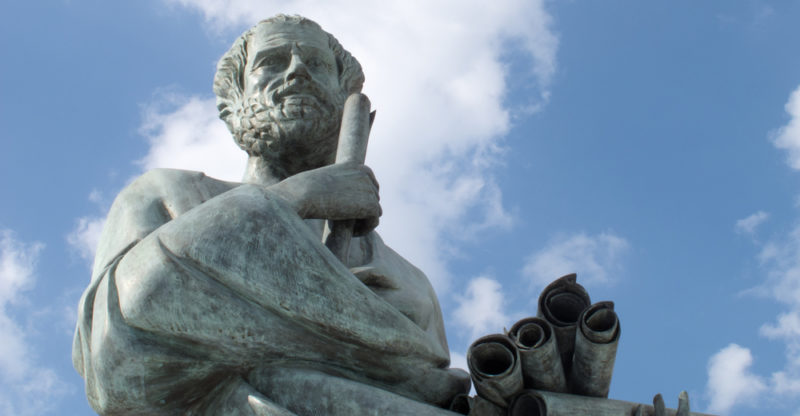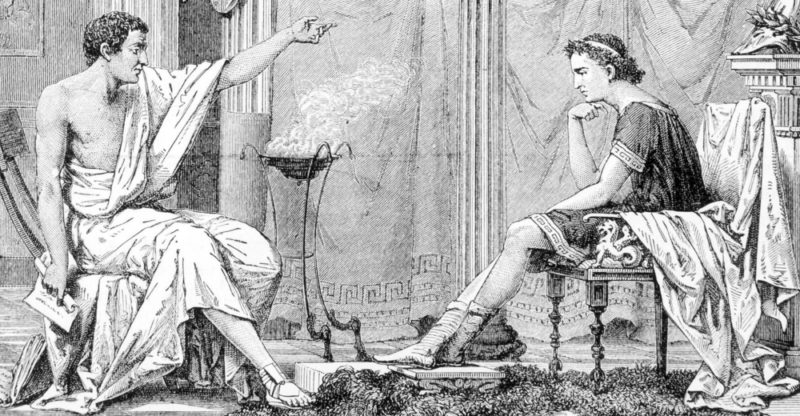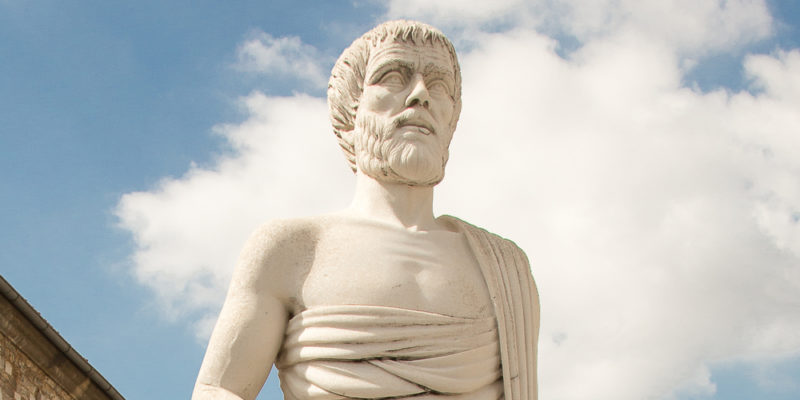We explain what Aristotelian thought is and the bases for its study. In addition, we explore its main characteristics and political philosophy.

Who was Aristotle?
Aristotle was an ancient Greek philosopher, scientist and logician. Although only 31 of the estimated 200 treatises he wrote have survived, his ideas have been influential to the present day. He lived between 384 BC and 322 BC.
Though he was a disciple of Plato, some of his ideas contradicted those of his master. Aristotle’s theories transformed knowledge and Western thought. He was the teacher of Alexander the Great, who protected him until his fall.
- See also: Ontology
Syllogisms
Aristotle is regarded as the founding father of logic, since he is credited with the earliest formal study of the subject and was the first to enunciate its principles. The basis of logic is syllogism, which is a logical and necessary deduction made through speech. Based on certain premises, a logical conclusion is reached. For example:
"All men are mortal. All Greeks are men. In consequence, all Greeks are mortal."
Principle of non-contradiction
This principle holds that a proposition and its contrary cannot be true at the same time and in the same sense. It is one of the basic laws of logic and is what allows for more complex arguments such as reduction to absurdity (reductio ad absurdum).
Fallacies

Aristotle discovered there are arguments that are valid in appearance but not in reality, which he called fallacies. This means fallacies have the form of a syllogism but contain a logical error that prevents the conclusion from necessarily deriving from the proposition.
An example of the fallacies studied by Aristotle is affirming the consequent. For example, "Whenever it rains, the courtyard’s floor is wet. The courtyard’s floor is wet, that is, it is raining." As can be seen, this reasoning may seem correct and yet it is not, since there are many other possible causes for the ground to be wet.
Unchangeable essence and changeable appearance
Essence is identified with the substance of things and remains unchangeable. Appearance, in contrast, is changeable. This division between the essential and the apparent can be applied to objects as well as to animals or people.
Opposition to Plato’s thought

Plato held that the knowledge gained through the senses was false and that truth could only be reached through reason. Aristotelian thought, on the other hand, is empirical, i.e., it is based on the observation of natural phenomena.
Many sciences
Aristotelian thought aims at the specificity of things. Thus, Aristotle grouped the sciences according to their specific object:
- Logic. The study of rational thought.
- Theoretical philosophy. Subdivided into physics, mathematics and metaphysics.
- Practical philosophy. Includes politics and ethics.
Astronomy: geocentric model
Aristotle proposed a geocentric theory, i.e. the Earth remained unmoving at the center of the universe and that all the planets, the stars and the Sun revolved around it. According to this theory, the universe is spherical in shape and finite, i.e., it has a boundary or limit.
Although this theory is wrong, it coincides with the direct observation of astronomical phenomena, and was therefore considered true until the 16th century, when Copernicus and later Galileo Galilei (17th century) contradicted it.
Elements of nature
He described nature as composed of five elements:
- Water and earth. They tend to move towards the center of the universe.
- Air and fire. They tend to move away from the center of the universe.
- Aether. It moves in a circle around the center of the universe.
With these principles Aristotle could explain different natural phenomena at a time when the law of gravity had not yet been enunciated and the measurement of density was unknown. For example, he could explain the fact that a stone sinks in water.
Political philosophy
For Aristotle, the State is the community of equals whose objective is to lead the best possible life. He considers man a political animal by nature, whose indispensable instrument is language.
He distinguished six forms of government:
- Monarchy is the government of a single person, which can degrade into tyranny.
- Aristocracy is the government of a group, whose perverted form is oligarchy.
- Polity is the government of many people, which can degrade into democracy.
Literary theory
Aristotle's Poetics is the first formal study of the arts in recorded history. In it Aristotle explored the structure, form and themes of tragedy. For centuries, Poetics was mistakenly considered a normative text, i.e. establishing how tragedies "should" be, while in fact it is a descriptive text, which merely depicts how tragedies were at his time. It is believed that Poetics also included a treatise on comedy, which has not survived.
Related articles:
Was this information useful to you?
Yes NoThank you for visiting us :)